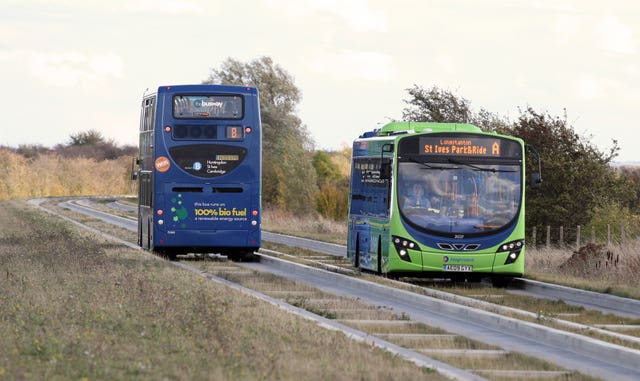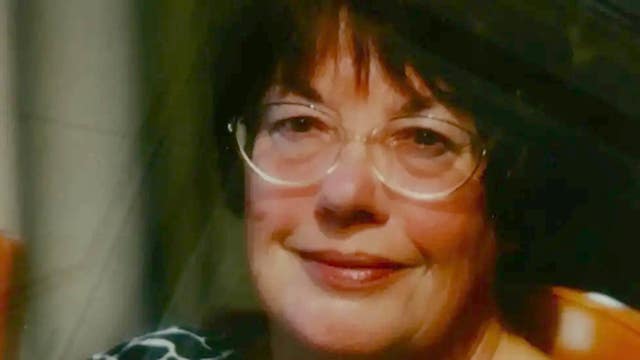Council fined £6 million after deaths and injuries on guided busway
Judge Mark Bishop said that Cambridgeshire County Council had taken a ‘rigid and blinkered approach to safety issues’.

A judge has fined a local authority £6 million for health and safety breaches on the world’s longest guided busway following three deaths and multiple incidents of injury.
Judge Mark Bishop said that Cambridgeshire County Council had taken a “rigid and blinkered approach to safety issues” in its management of the Cambridgeshire Guided Busway.
He said that the incidents spanned some 11 years, and noted that when the busway opened in 2011 the operating speed was to be 56mph – “clearly too fast a speed for buses to move in an urban or semi-urban environment”.

The busway, which involves a modified bus being guided along a track, is a 16-mile route which uses old rail lines to link Cambridge, Huntingdon and St Ives.
The court heard that, on guided sections, buses follow the track and cannot steer.
Parts of the busway route have a busy pathway alongside it, and originally there was no fence to separate cyclists and pedestrians from the busway.
Pedestrians Jennifer Taylor, 81, Kathleen Pitts, 52, and cyclist Steven Moir, 50, all died in separate incidents on the transport link.
The judge, giving his sentence at Cambridge Crown Court on Wednesday, said: “I acknowledge the financial challenges that face the defendant, I don’t underestimate that.”
But he said the council had a turnover equivalent of more than £1 billion per year and had set aside more than £18 million in a reserve fund to cover legal risks.
Ben Compton KC, for Cambridgeshire County Council, requested that the authority be given six years to pay the £6 million, adding: “It’s a council – these are hard times.”
But the judge rejected this and gave three years to pay, and also ordered that the council pay more than £292,000 in outstanding costs.

He paid tribute to the “dignity” of family and friends of those killed or injured who attended court.
“Nothing that can be said in court can take away the loss that you’ve suffered but I want to express publicly our condolences to the bereaved and also to wish you well for the future,” he said.
“And out of this case let us hope that nothing like this will happen again.
Mrs Taylor, who was fatally struck by a bus in 2015, had been trying to cross the carriageway.
She had disembarked one bus at an unlit request stop, having overshot her stop, and was trying to cross to the other side to take a bus back when she was struck.
Father-of-three Mr Moir died in 2018 after his bike clipped a kerb separating him from the busway and he fell into the path of a bus travelling at 55mph.
Ms Pitts died after she was struck on the head by a passing bus.
The judge said the defence submitted that “on the balance of probabilities” her death was “caused by her own volition”, and that prosecutors “accept I cannot be sure to the criminal standard that Ms Pitts didn’t lose her life by her own volition”.

The judge said it was not his place to “displace the role of the coroner”, but that he found that the risk Ms Pitts faced from the busway “more than minimally contributed to her death”.
The county council admitted at an earlier hearing to two charges under Section 3 of the Health and Safety at Work Act 1974, relating to the public trying to cross the busway at designated crossings and being struck while moving alongside the busway.
A two-day sentencing hearing took place last month, before the judge returned to pass judgment on Wednesday.
The judge said it was “clear that changes for the better in the guided busway have been underway since 2022”, noting reductions in speed limits and the installation of fencing.
Mr Moir’s brother, Rob Moir, said outside court afterwards: “There are no winners here. It’s taxpayers’ money at the end of the day.
“Hopefully it will be sufficient to make sure that not just this county council but other people, other councils, wake up and make sure they apply the due diligence that they should to health and safety.”
Graham Tompkins, a principal inspector for the Health and Safety Executive, said afterwards that the death of Mrs Taylor “should have been a wake-up call” but “sadly, lessons were not learned”.
“This is a significant moment for the families,” he said.
“This case has been hanging over them like an awful storm.
“I want to pay tribute to their courage, and I hope that finally, this outcome gives them some closure so they can move on with their lives.”





